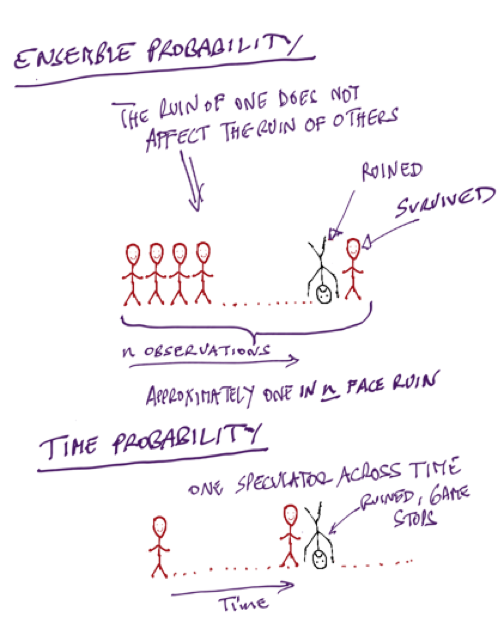 Abhishek Bose·Monday, July 27 2020·Improve this Guide
Abhishek Bose·Monday, July 27 2020·Improve this Guide
⚖️ Risk-Taking and Ergodicity
"In order to succeed, you must first survive." - Warren Buffet
A lot of folks here in India might look at the remote working trend as a modern-day gold rush. Suddenly there is a stream of information that highlights the success stories of folks working remotely.
We have been guilty of that as well. The anonymous survey we did to figure out salaries certainly got people pumped up and dreaming.

This guide is about not throwing caution to the wind. It is about understanding the risks before you jump onto the bandwagon. There is certainly a lot of upside in working remotely, but we want to make sure that you take care of the downside.
"In order to succeed, you must first survive." - Warren Buffet
Survivorship bias
Survivorship bias is the act of focusing only on successful people and ignoring those that failed.

A lot of people discount the fact that things can go wrong while working remotely. They look at folks who are doing well and feel they might be able to do the same. The probabilities of success from a collection of people do not necessarily apply to one person.
Which brings us to the next idea.
What is ergodicity?
In the gig economy, Ergodicity is the number one thing to keep in mind to thrive. Platforms like Upwork, Toptal will show us data (standard cost-benefit analysis) which would suggest that the gig economy is a godsend for all. And that working as a freelancer is a good strategy.
Please look out for yourself. What is favourable for the platform (or capitalism in general) is not necessarily favourable for the individual.
In an ergodic scenario, the average outcome of the group is the same as the average outcome of the individual over time. An example of an ergodic system would be the outcomes of a coin toss (heads/tails).
In a non-ergodic system, the individual, over time, does not get the average outcome of the group. Understand that remote work or freelancing is non-ergodic.

How do you reduce this risk ( 4 Actionable Takeaways )
Start an Emergency Fund
Keep 6-12 months of your expenses in a liquid fund that you can use in times when things are not going your way. This buffer will help you stay calm if your contract is suddenly brought to a close.
Remote jobs are notorious for long cycles to confirm a job offer. Without an emergency fund, you might panic and say yes to opportunities even when they don't align with your values.
Don't put all your eggs in one basket
The Barbell Strategy is an approach that advocates playing it safe in some areas and taking a lot of small risks in others.
For example, You can get a predictable job, while spending 5 hrs every week on something risky eg. side project, open-source, moonlighting.
The combination of the two is more ergodic than either alone. You can spend just 10% of your time on a side project and 90% on your job (barbell). Hopefully one of your side projects will replace your job in the long run. Or you can get a much higher paying job because of your open source contributions.
Have a decision journal
No matter how many books(frameworks) we read, we generally learn the best from our experience.
Our success as a remote worker will be the sum of the decisions we make over our careers. This is where a decision journal might help you.
It gives you a space to collect your thoughts at the time you made the decision. And then you can review these notes once every quarter.
⚠️ Disclaimer: Reserve it exclusively for the larger decisions that have potentially major consequences and require some serious thought and deliberation.
Here's a template to get you started. Feel free to iterate on the questions.
Be deliberate about learning and investing in relationships
This one's a no-brainer to me. Learning has a tremendous upside and almost zero downsides.
The great thing about my job is that you are pretty much paid to constantly learn and acquire new skills. That said, having a 1-hour block (or even 30 mins) helps to keep the axe sharp.
It's the same with building your network. For eg. DM’ing people on Twitter (or on RI slack 😉) is an asymmetric opportunity to improve your life and remote working career.
"When you ask someone how they landed their job, 70% of the time they’ll say it was down to networking. If you ask a company how they fill their roles, you’ll learn that 80% of the time they never actually advertise their jobs online or elsewhere. And, here’s the crucial one: only 7% of all job applicants come through a referral — yet referrals account for 40% of hires."
This guide isn’t about painting a doomsday scenario. We just wanted to caution folks against taking too much risk and driving themselves to ruin.
More fortune and wealth to you 💪
